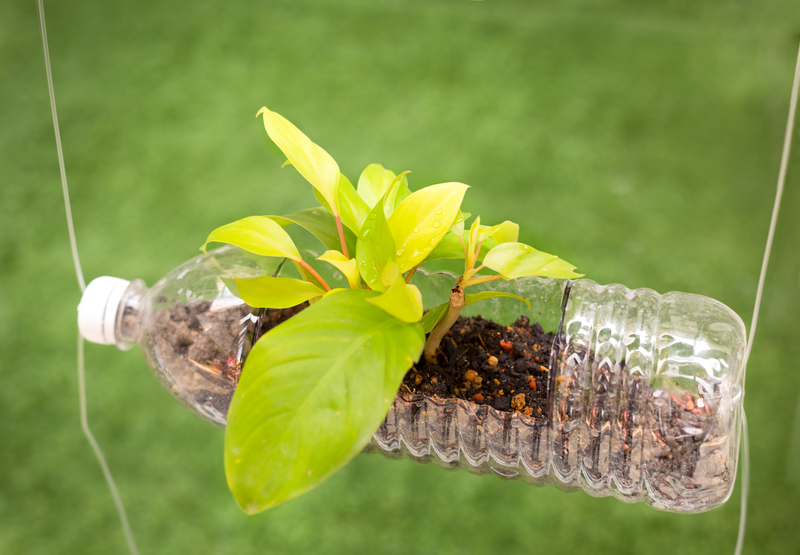Eco-Friendly Practices to Reduce Waste at Home
In our modern world, household waste has become a major concern for eco-conscious families and individuals. Embracing eco-friendly habits and adopting sustainable routines can significantly minimize our environmental footprint. Whether you're just starting or looking to advance your green journey, implementing various practices to reduce waste at home will benefit your household, community, and the planet.

Why Reducing Waste at Home is Important
Landfills overflow with tons of waste every day, much of which originates from homes. Not only does this strain local resources and contribute to pollution, but it also leads to the unnecessary use of valuable materials. By reducing waste, families play a pivotal role in conserving resources, decreasing pollution, and fighting climate change.
- Protects the environment by lowering pollution and conserving resources
- Saves money on utility bills and grocery shopping
- Promotes healthier living and fosters a sense of community
Comprehensive Strategies to Cut Waste at Home
1. Reduce, Reuse, Recycle
The "three Rs" are foundational to a zero-waste lifestyle. Here's how to implement each step:
- Reduce: Be conscious of your purchases and avoid buying unnecessary items with excessive packaging.
- Reuse: Opt for reusable shopping bags, water bottles, and storage containers.
- Recycle: Sort paper, plastics, metals, and glass according to local recycling guidelines.
Attentiveness to these habits will dramatically decrease the amount of waste generated at home and promote an eco-friendlier lifestyle.
2. Composting Organic Waste
Composting is a natural process that turns food scraps and yard waste into nutrient-rich soil. Instead of sending organic waste to landfills, where it emits methane, composting gives waste new life. Here's how to start:
- Set aside a small bin or compost pile in your backyard or use indoor composting systems if space is limited.
- Add fruit and vegetable scraps, coffee grounds, eggshells, and yard trimmings.
- Avoid meat, dairy, and oily foods, which can attract pests.
- Turn the compost regularly to aerate it and speed up decomposition.
Within several months, you can enrich your garden with homemade, natural fertilizer, closing the waste loop at home.
3. Bulk Buying and Reducing Packaging
Many products come in superfluous packaging that ends up in the trash. By buying in bulk, you cut down on waste and potentially save money. Use your own containers at bulk stores, bring cloth produce bags, and select products with minimal packaging whenever possible.
- Choose items in recyclable packaging or those offered without packaging at zero-waste stores.
- Purchase larger quantities of staples like rice, beans, and flour to reduce the frequency and packaging of each purchase.
Being proactive about packaging is one of the most effective household waste-reduction strategies.
4. Embracing Reusable Products
Single-use items create a tremendous amount of waste. Replace disposables with durable, eco-friendly alternatives such as:
- Stainless steel water bottles
- Silicone zip bags, beeswax food wraps, and glass containers
- Cloth napkins and towels instead of paper
- Reusable shopping bags and produce sacks
- Rechargeable batteries
Transitioning to reusable items may require an initial investment but offers significant environmental and cost-saving benefits over time.
5. Repurposing and Upcycling
Get creative and find new uses for items rather than discarding them:
- Turn glass jars into food storage or vases.
- Repurpose old clothing into rags or donation items.
- Craft furniture from wooden pallets or turn old containers into planters.
This eco-friendly approach not only cuts down on waste but also fosters a culture of sustainability at home and sets a great example for others.
6. Sustainable Food Practices
Food waste is a huge contributor to household garbage. By practicing mindful shopping and cooking, you can change this. Some techniques include:
- Creating a weekly meal plan to avoid overbuying perishables
- Shopping with a list to resist impulse purchases
- Storing leftovers in transparent containers to ensure they're eaten
- Freezing excess portions for future meals
- Donating unused but edible food items to local food banks
Such eco-conscious habits help reduce not just your waste output, but also your grocery bill.
Eco-Friendly Household Swaps
Simple swaps at home can make a substantial difference in reducing your waste. Try the following eco-friendly alternatives:
Plastic-Free Kitchen
- Use bar soaps instead of liquid soaps in plastic bottles.
- Replace sponges with biodegradable alternatives like bamboo or coconut scrubbers.
- Purchase dish soap and cleaning products from bulk or refill stores.
Sustainable Bathroom
- Install a bidet or use toilet paper made from recycled content.
- Switch to bamboo toothbrushes and bar shampoo or conditioner.
- Choose menstrual cups or cloth pads over disposables.
Eco-Friendly Cleaning Practices
- Make your own cleaning products using vinegar, baking soda, and essential oils.
- Use washable microfiber cloths rather than disposable wipes.
The above changes help eliminate single-use plastics and move your home toward zero waste living.
Responsible Disposal and Recycling
Proper waste segregation and disposal are crucial for green households. Follow these steps to maximize your recycling efforts:
- Rinse recyclables to avoid contamination.
- Research your local recycling rules to avoid "wish-cycling."
- Bring hazardous materials (paint, batteries, electronics) to proper collection sites.
- Compost what you can and avoid sending organic waste to landfills.
The goal is to keep the maximum amount of material out of the landfill, conserving resources and protecting the environment.
Reducing Energy Waste
Reducing waste isn't just about physical products. Conserving energy and water also play a vital part in sustainable living:
- Switch to LED lightbulbs and use energy-efficient appliances.
- Unplug devices when not in use to avoid phantom energy drain.
- Take shorter showers and fix leaking faucets to save water.
- Launder clothes in cold water and line-dry whenever possible.
Managing energy and water use helps lower utility bills and keeps your household waste-free and efficient.
Involving Everyone in the Household
Achieving an eco-friendly home is most effective when the entire household participates. Here are some tips to involve everyone:
- Explain the environmental impact of waste to family members.
- Assign roles for sorting recyclables, composting, or shopping.
- Set goals and celebrate milestones to maintain enthusiasm.
- Teach children about sustainability through fun activities or games.
Working together creates lasting habits and sets a strong example for friends and neighbors.
Benefits of Zero Waste Living
Adopting waste reduction at home brings countless advantages beyond environmental preservation:
- Cost Savings: Using products longer and wasting less food saves money.
- Health Improvements: Fewer harmful chemicals and plastics in your life.
- Better Community: Inspiring neighbors or participating in local environmental programs strengthens social bonds.

Tips for Getting Started with Eco-Friendly Waste Practices
If you're new to going green, begin with small, manageable steps:
- Pick one area to improve, like reducing kitchen waste or starting a compost bin.
- Track your progress and adjust as you learn what works.
- Seek out local resources--bulk stores, community gardens, recycling centers--for support.
- Stay informed by following eco-friendly blogs, podcasts, and community events.
Remember, consistency beats perfection. Every action you take counts toward a cleaner, healthier planet.
Conclusion: Join the Movement Toward Eco-Friendly Living
Every household plays an essential role in building a sustainable future. By practicing the strategies discussed above, you're not just reducing waste at home; you're fostering a culture of environmental responsibility and inspiring others. From composting and reusing to mindful buying and energy conservation, every effort makes a difference.
Make a commitment to eco-friendly home waste reduction today! Share your progress, support local initiatives, and continue to educate yourself. Together, we can create cleaner communities and protect the world for future generations.
For more tips and in-depth guides on sustainable living, stay tuned to our eco-friendly blog for the latest insights into green home practices.